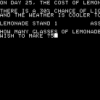5 years indie Game Designer, What next?
My name is Andreas and Im 27 years old.
I have been working 3 years with Wolt Studios as a Game Designer and 2 years helping small indie teams to shape and re-polish their
games.
Unfortunately as many of you are aware, many didnt make it to sales and due to this reason I havent been able to create any portfolio.
(I could create one, but it will be unfinished jobs, which I think there will have more negative feedback than positive as "I never finished any of my work")
I would like to find a funding project, because they are more likely to reach at least Beta, and they are more realistic on their targets.
I ve been posting on every forum I could find but with no luck. Only teams which offer the usual "paid-on-release" deal.
I dont say that passionate team wont make it to the release, but we all know very well that this is a very small number.
I ve worked with teens, with middle age and seniors. I dont have any issues with the age.
What I am trying to say is, I would like at last to get into an indie company (proper indie games development ) and start creating and releasing games so I could start filling up a portfolio.
Due to my University studies, I can only work as Freelance unfortunately.
So I turned to this forum seeking guidance on how I could proceed from here. I know if I keep helping indie teams, most of them(if not all) wont make it, since there is no funding)
What I ve tried and didnt work was offering a week-free of charge for teams to try me out and see if I fit their needs as a Game Designer, but no serious response so far. (I had few to be honest, but they were again "paid-on-release" which I wont lie, it worries me).
Any Advice from the great Game Designer Sensei(s)
Thank you for taking the time to read my post. Looking forward for your reply
Regards
Andreas
*EDIT: corrected a phrase which kept confusing readers about my main goal to work with between Game Industry Company (such as EA) or Indie Company
Thank you Orymus3*
I'm not 100% sure what you're asking, are you looking for advice on how to get a paid job in the game industry? In that case my advice is to spend some time creating a portfolio - on your spare time - fill it with whatever it is you're good at, write a standard CV listing any previous jobs and studies you've had, and send both of these by email to as many potential employees as you can. If you haven't received a reply within a week, call them and make sure they've "seen your email". If you get turned down, try your one week offer. If they're still not interested, thank them for taking their time and move on to the next employee.
Thank you papulko for your quick reply. Yes Im looking for advice on how to get in indie company work as a Freelance Game Designer. But all the teams i ve joined so far were "paid-at-release" deal, which none of them made it into any release, nor Beta.
The only thing I have is personal experience I ve gain from my involvement with the team I was working with, and the small teams I ve been helping out. But most of them are already out of business and the books/articles/forums. And I feel that if I create a portfolio it will be without solid background because it wont have any source to check if what I have in it is of any value.
The only way out I can see is to take few courses and add them in the portfolio, as well as try again with small indie companies hoping they will stick until a Beta release.
The Courses are already planned, but I would really like to work with an indie team which already have released one game, or are dedicated on what they do. The problem is, how do I convince a team with already 1 Game Designer to accept me, or how can I evaluate a team that is dedicated or just "excited" about making a game (which last 1-2 months)
many didnt make it to sales and due to this reason I havent been able to create any portfolio.
That's a nonsequitur. The work you did absolutely should be in your portfolio, provided none of your past contracts forbade you to use it that way.
What I am trying to say is, I would like at last to get into the industry (proper game industry) and start creating and releasing games so I could start filling up a portfolio.
Due to my University studies, I can only work as Freelance unfortunately.
You have that all backwards, really. Try this plan:
Start Creating (include the assets you've previously created that weren't released) THEN Fill Up Portfolio (throw in some releases if possible, free or otherwise) THEN Get into the game industry.
I'm not sure what you are studying at Uni, but, if at all related, include your coursework into your portfolio as appropriate.
@GoCatGo
Unfortunately My uni studies are not relevant to Game Designing. I started game Designer as a part time job, but due to researches and knowledge I ve gained from it, this job started feel like home to me. And I would like to expand it.
I already started few projects where the team dropped off. I could include those projects, even though they are not completed. The only way out I can see is, to manage and create something simple and small.... something playable for the portfolio as finished or test project of mine. The problem is that my coding skills are not as good as a proper programmer and I could create very basic things.
@Tom Sloper
I guess you are right. I could fill in hte unfinished projects. At least this way it will be visible to the reader that I was involved in variety of projects and different Game Styles.
P.S. I am reading your website about Game Designers and I have to say that you are a big inspiration to me. Thank you for all your work/lessons that you have provide online. Where I though I had enough experience, you come and show to me that there are so much more to learn. I havent finish all the lessons yet, but so far it helped me during work a lot :)
Thank you both for taking the time to help me in my adventure.
The problem is that my coding skills are not as good as a proper programmer and I could create very basic things.
Do what you can with what you have. It's that simple. Take a project from start to finish using your skillset and design sense. That complete project will be worth its weight in gold when added to your portfolio, regardless of coding, art, or any other thing you might be worried about.
Skills can be taught, tools can be mastered, but people who actually get things done are few and far between. Show you can get it done despite any limitations.
The problem is that my coding skills are not as good as a proper programmer and I could create very basic things.
Do what you can with what you have. It's that simple. Take a project from start to finish using your skillset and design sense. That complete project will be worth its weight in gold when added to your portfolio, regardless of coding, art, or any other thing you might be worried about.
Skills can be taught, tools can be mastered, but people who actually get things done are few and far between. Show you can get it done despite any limitations.
Will do. Thank you for the advice. Meanwhile I will keep an eye open for any opportunity until I get a basic portfolio (as TS suggested) and make something small but creative myself
"I never finished any of my work"
If the project was canceled by powers beyond you and you were just aboard for the ride, then it can be explained. Sadly, it will show only your skills at starting something, and generally, its much harder to finish things, because no matter how imperfect, you need to signoff on certain things that could be improved but will be 'good enough' (and understanding what 'good enough' is in the context of game development is critical, and varies depending on various factors).
The reason why I think you're struggling to find a suitable project is because you are trying to board the incredibly niche group of people that self-fund their games. These indies work in very small teams, need to cut on expenses, and generally start the project because they have an idea and will cover at least the designer's position (and generally others too).
Your post seems to want to hit two targets: get money and learn.
To learn, you can do it on your own (code your own game to demonstrate mechanics put in action, or balancing values put to the test).
To earn money, you can do another job. Heck, you can do some retail salesmanship (this should give you PR skills which are essential to any good designer as communicating efficiently and remaining respectful all the while steering a conversation towards an objective really help in the industry).
What's your ultimate goal though, I'm not clear on whether you want to remain indie or break in the industry.
I don't mind the earning money part atm. But I figured that if I join a team which doesn't have funds, and no any released game under their belts they usually doing it out of excitement and misunderstanding the struggle that need to make a complete game. Which always lead to lose interest and stop the development of the game.
That is the reason why I would like to find a team that can fund the project. Because it will be way more likely for the game to reach at least a beta stage. (Even though I know some self fund projects which still didn't make it to beta... but that was due to bad organization from the leader/owner.
My problem was "how can I prove to those who have funds that I am hard working if I don't have any finished game myself".
But I got some tips on how to proceed from here:
Tom Sloper - That's a nonsequitur. The work you did absolutely should be in your portfolio, provided none of your past contracts forbade you to use it that way.
GoCatGo -Take a project from start to finish using your skillset and design sense. That complete project will be worth its weight in gold when added to your portfolio, regardless of coding, art, or any other thing you might be worried about.
Orymus3 -If the project was canceled by powers beyond you and you were just aboard for the ride, then it can be explained.
You have answered my biggest question that hold me back from creating a portfolio.
Tom Sloper answered to me if I should do it or not - obviously yes
And GoCatGo gave me the tip of creating something basic but with a spice of a good game design. Which I already started working on the GDD and I know exactly what I have to do.
As well I will start creating a portfolio from Monday and I will share it here for feedback.
P.S. I saw what could cause the indie/industry confusion. And I will edit this soon








